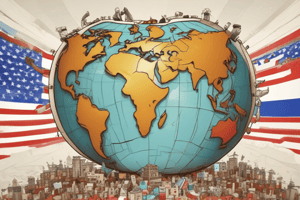Podcast
Questions and Answers
Which term refers to the practice of influencing government policy through organized efforts?
Which term refers to the practice of influencing government policy through organized efforts?
- Filibustering
- Lobbying (correct)
- Gerrymandering
- Voter suppression
What is the primary purpose of a political party?
What is the primary purpose of a political party?
- To represent diverse opinions
- To conduct elections independently
- To create public policies
- To mobilize voters and gain political power (correct)
Which of the following is considered a right of citizens in a democracy?
Which of the following is considered a right of citizens in a democracy?
- Freedom of speech (correct)
- Censorship of opinions
- Mandatory voting
- State-controlled media
What does the term 'sovereignty' refer to in political science?
What does the term 'sovereignty' refer to in political science?
Which system of government is characterized by the separation of powers among branches?
Which system of government is characterized by the separation of powers among branches?
Flashcards
Political Science
Political Science
The study of government, power, and politics.
Government
Government
Formal structures and processes that make and enforce rules in a society.
Power
Power
The ability to influence or control others.
Politics
Politics
Signup and view all the flashcards
Study of government
Study of government
Signup and view all the flashcards
Study Notes
Branches of Political Science
- Political science is divided into several key areas of study.
- These areas often overlap, with many elements intertwining.
- Key subfields include political theory, comparative politics, international relations, and political methodology.
- Political theory examines the philosophical underpinnings of political thought and behavior.
- Comparative politics analyzes political systems across different countries and regions, focusing on similarities and differences.
- International relations studies interactions between states and non-state actors on the global stage.
- Political methodology deals with the methods used to study politics, including research design, data analysis, and statistical modeling.
Key Concepts in Political Science
- Power: The ability to influence or control others, often through persuasion, coercion, or authority.
- Authority: The legitimate right to exercise power, typically stemming from social norms, tradition, law, or consent.
- Legitimacy: The acceptance and recognition of a ruling power's authority by the people it governs.
- Sovereignty: The supreme and ultimate authority within a territory.
- Citizenship: The status of membership in a political community, usually accompanied by rights and responsibilities.
- Democracy: A system of government where citizens have the power to participate in decision-making processes.
Key Concepts – Ideologies
- Liberalism: Emphasizes individual rights, freedoms, and limited government intervention in the economy.
- Conservatism: Values tradition, order, and social hierarchy; often promotes a balance of individual liberties with governmental involvement to accomplish these goals.
- Socialism: Advocates for social ownership or regulation of the means of production, distribution of wealth, and an emphasis on social and economic equality.
- Communism: A more radical form of socialism advocating for a classless society with communal ownership of the economy and often a rejection of existing institutions.
- Fascism: Emphasizes a strong unitary state, national unity, and a hierarchical social order, often characterized by authoritarianism and the suppression of dissent.
Political Systems
- Democracies: Various types exist, ranging from parliamentary systems to presidential systems, with differing levels of citizen participation and representation.
- Authoritarianism: Regimes characterized by limited or no political freedoms, centralized power in the hands of a single leader or small group, and suppression of dissent. Examples would include totalitarian regimes and oligarchies.
- Monarchies: Systems where supreme authority is held by a monarch.
- Other systems: Often hybrids or combinations of other categories like theocracies (rule by religious leaders), and different kinds of republics.
Political Institutions
- Legislatures: Bodies responsible for making laws, typically composed of representatives elected by the people.
- Executives: The branch of government responsible for implementing laws (e.g., presidents, prime ministers, and cabinets).
- Judiciaries: Courts responsible for interpreting laws and settling disputes.
Political Processes
- Elections: Systems for selecting representatives in democratic societies.
- Public Opinion: The aggregate of individual citizens' attitudes and beliefs about political issues.
- Political Parties: Groups organized to compete for political power in elections.
- Interest Groups: Associations of individuals who share common interests and attempt to influence policy.
International Relations
- Diplomacy: Interactions between nations to achieve specific goals or resolve issues.
- Alliances: Formal or informal agreements between countries to cooperate on political, economic, or military matters.
- Conflict and war: Armed conflict between nations and the various causes of conflict, both historical and contemporary.
- International organizations: Groups of states working collectively toward mutual benefit (e.g., the United Nations, NATO).
Studying That Suits You
Use AI to generate personalized quizzes and flashcards to suit your learning preferences.



